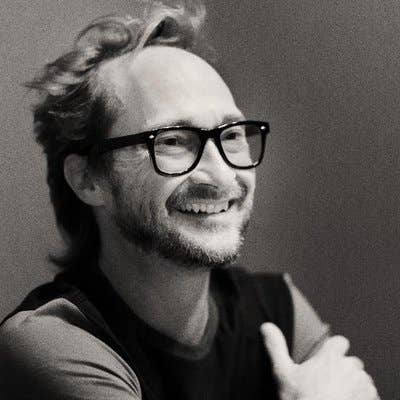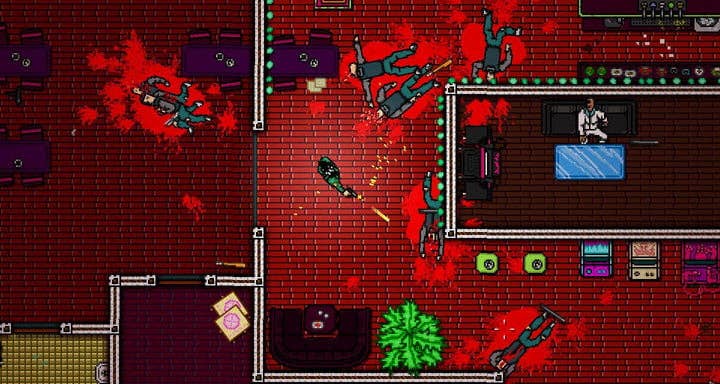"What's your plan to not destroy yourself as you're stepping into this career path?"
At Reboot Develop, Devolver and Good Shepherd co-founder Mike Wilson discussed the need for unions, mental burnout, and dealing with online toxicity
The debate over whether games professionals need unions to protect their rights was one of the most prominent topics at this year's GDC.
Much of this centred around a talk by new IGDA president Jen MacLean, where even the audience began sharing tales of poor working conditions and "insane mandatory crunch". It was suggested a union could prevent this, although MacLean remained sceptical, a stance she reiterated in our interview with her.
This debate continued at Reboot Develop last week during a beachside chat with Devolver Digital and Good Shepherd co-founder Mike Wilson. The indie publishing exec agreed that unions are a practical way to solve these issues, but suggested that no single body could accomplish this alone.
"The good thing is we have other art forms to look at that have already been through this and figured it out," he told attendees. "If you ask people who work in films professionally what their life would be like without their unions, or musicians... It's hard enough to be successful without literally having to chase your money down. Some organisations, their only job is to chase your money down, and it's a pretty big and comforting thing to know there's someone doing that. Because, as we've seen, if you don't have people doing that, someone will just take your shit and run with it."

He elaborated on the film example by pointing out the multitude of guilds that have been formed to represent various disciplines: writers, directors, actors, producers and so on. However, Wilson noted that such a system might not be a direct fit for video games, as the key difference with film is the vast majority of work and decision making is done in a single area: Hollywood.
"Our industry is much more global, but I do think we could start in California and try to address things in the way they have," he said. "We've got to do something. Maybe it will be a global guild, or an online guild.
"I don't know how it's going to evolve. I don't know if it's an area I can affect as much because I ran as far away from AAA as I could when I saw the industry getting bigger but less fun. The conversations are happening, though. I got asked a dozen times at GDC.
"I actually registered the URL "gamedevelopersguild.com" back in 1998. I've not gotten around to that, so if anyone else has more energy the URL is yours. But some sort of guild needs to happen, or at least some money to fight legal battles because that's still a big part of why game developers get shoved around so much. Individuals don't have the wherewithal to fight big legal battles, and sadly in the world of big business that means companies can do whatever they want."
The talk of guilds and unions started earlier in the conversation when the host - former GamesIndustry.biz editor Dan Pearson - asked Wilson about how good the industry and its members have become at sharing their experiences, and whether this was raising awareness of mental health issues brought on by excessive work.
"I registered the URL for a game developers guild back in 1998. I've not gotten around to that, so if anyone else has more energy the URL is yours"
"Well, the crunch thing that's breaking people in big studios - that's not new," Wilson observed. "That's just a dirty, dirty secret that the industry has failed to address for 20 years, which is pretty shameful considering the amount of money being made. We just don't talk about it, and I guess... since there are no unions for games developers, the industry bodies don't want to piss off the publishers that are often their biggest sponsors.
"[But] there's an awful lot of people there being misused and abused, and their families broken by being told they're going to work seven days a week for the next six months with no additional pay and that's just the way it is. Then there's also that peer pressure within that system, which is a big part of it too, so it's not even the boss."
Wilson went on to suggest that the way to get larger publishers and studios on board with efforts to improve the representation for workers in the industry is to highlight how crunch and subsequent mental health issues are affecting their products - and therefore their profits. This has already started in other industries.
"There are people going to the big studios - and big companies in general, not just in games - saying, 'Hey, your team would be a lot more productive and you would make a lot more money if your people weren't sick and tired all the time'," he said. "So some places are getting meditation rooms, wellness programs, nutrition programs. Sadly, that's the way you have to pitch it to these big companies, that it will affect their bottom line or save them however much in insurance. But whatever works, man."
"Crunch is just a dirty, dirty secret that the industry has failed to address for 20 years, which is pretty shameful considering the amount of money being made"
Wilson stressed that this issue is by no means limited to those working in AAA studios. Even the smallest indies are imposing tough working conditions, often to the detriment of their health, purely to meet the unique pressure that smaller games studios face.
"The biggest problem is they're now expected to have direct conversations with their audience on a regular basis throughout," he explained. "That's something that no other artist in the history of making art has had to figure out.
"These are already people trying to do something very hard: make a game that stands out from the thousand games coming out each month with just two or three people, and knowing that the audience will never understand it's just two or three people. They'll just assume it's some big studio and should be as good as [bigger] games.
"The gaming community is... great at being complete fucking assholes online, and I don't understand why that is. When you're having a hard day and there's a thousand people on Twitter at any time willing to agree that you're a piece of shit, that you should stop working because you're never going to make anything good, it's pretty hardcore for a sensitive person.
"I think that's why the indies are having such a hard time. It's just this mass of noise from a mix of fans and monsters online. And it doesn't matter if you read a thousand great comments, it's that one or two that say you're an absolute worthless piece of shit that sticks in your heart when you least need it."

Wilson is unsure how this might be resolved, suggesting that the community will ultimately have to fix itself: "You can't just say 'you have to be nice' from on high. People do try to moderate to some extent, but I think it's really down to the community to say, 'Hey dude, that's not cool at all'."
Before that, however, Wilson predicts that we'll see "more artists actually retreat from this constant interaction" because it's unmanageable, especially in the midst of trying to develop a game. Wilson likened it to celebrities, some of whom face so much abuse online they hire PRs and assistants to handle social media on their behalf.
"I hope it doesn't come to that because it's pretty cool to be able to interact with the artists you love directly, to ask questions and feed them compliments on their work. I really hope it doesn't become something where you're talking to a PR all the time on Twitter."
"I do think the more women we get into the business, the better - just to counter-balance some of that ridiculous male shit that goes on"
He continued: "We have to keep reinforcing that this is an important issue. With aspiring developers that means while you're learning to code, or learning Unity, or whatever you feel you need in your toolset to be a successful developer, knowing how to take care of yourself has to be one of those. What's your plan to not destroy yourself as you're stepping into this career path?"
Wilson has experienced some of the most severe cases first-hand while working with some of the indies he helped publish at Devolver. The duo behind Hotline Miami - Jonatan Söderström and Dennis Wedin - were both hospitalised for mental health issues or stress at some point during each game's development.
"And those aren't the only people working with Good Shepherd and Devolver," he said. "I personally know of four individuals that were hospitalised trying to finish their games. That's when I was like, 'This has to be a conversation'. Because if there were four that were hospitalised, there has to be 40 more at least that were very nearly there and couldn't push that panic button, often because they had to make their game."
The negative effects of crunch and poor working conditions are well-documented today, but there was a time where there was a sense of pride around it, with developers bragging about how many hours they had spent coding in a single week.
Indeed, there still seems to be an element of this, with NeoCoreGames claiming it would institute 90-hour weeks to ensure its project gets finished (and later claiming this was a joke). Pearson suggested that the fact that the games industry is male-dominated results in an element of "machismo", and Wilson is hopeful that this will soon die out.
"It seems to be with millennials that the biggest favour we've done them is to demonstrate how not to do anything," he said. "So hopefully they're learning anyway and not emulating their idiot heroes who worked themselves to death. But yeah, it's a slow evolution and correction. I do think the more women we get into the business, the better - just to counter-balance some of that ridiculous male shit that goes on."








